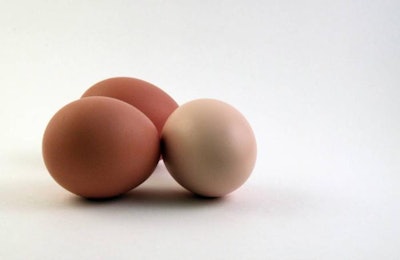
Aging hens produce larger, albeit more fragile, eggs. Cracked eggs among older hens can exceed 20 percent, and for obvious reasons, these eggs are a negative mark for the egg industry.
1. Calcium absorption
The main reason why older layers produce more cracked eggs has to do with egg size. As they deposit a fixed amount of calcium per egg (2 grams), and calcium is the main element that provides strength to the shell, it is expected for a larger egg to have a thinner shell. With age, calcium digestibility and metabolism are impaired, while adding excessive amounts of dietary calcium only makes things worse. To this end, enhancing calcium digestibility and absorption appears to be a viable alternative. Thus, adding a more digestible source or form of calcium is recommended for diets during the last phase of egg production. In addition, adding organic acids and extra vitamin D have been shown to further improve the calcium balance, and consequently egg shell quality.
2. Phosphorus and phytase
Phosphorus is the second most influential mineral regarding eggshell quality. Here, the effect of this mineral can be antagonistic to that of calcium, as too much dietary phosphorus reduces intestinal calcium absorption. Thus, most layer diets tend to have low levels of phosphorus, but this can cause its own problems: it has been reported that when phytase is part of the phosphorus equation, then the already marginal dietary phosphorus levels can become limiting if phytase efficacy is impaired. How this might relate to older hens is still unknown.
3. Vitamin D and metabolites
Vitamin D is part of the calcium-phosphorus homeostasis within the organism. Thus, high levels of dietary vitamin D can influence positively eggshell quality. Nevertheless, there is a natural bottleneck in vitamin D metabolism, which can be by-passed by using an active metabolite of vitamin D, instead or in addition to the usual form. As this bottleneck becomes even more limiting in aging hens, better results are expected when using an active metabolite -- but this has not been unequivocally confirmed.
4. Micro-elements and organic forms
In addition to calcium, several micro-minerals influence eggshell quality. These include zinc, manganese and coppers, which all act as cofactors of enzymes involved in the mineralization process during eggshell formation. Several studies have indicated that increasing dietary concentrations of these micro-elements increases eggshell resistance, but only in layer hens. However, adding high levels of such nutrients may be restricted by legislation, as is the case in the European Union. To this end, using organic forms of zinc, manganese and copper appear to be an alternative way to increase absorption of these minerals, as organic forms appear to be more digestible than inorganic forms. Here, it merits mentioning that not all organic forms perform the same and, as such, picking the right one for the right purpose is critical. In addition, it appears that a mix of organic and inorganic forms might be better compared to an all-organic supply of these micro-minerals.
In closing, we must acknowledge that lower eggshell quality is a fact associated with age and metabolic fatigue caused by high productivity in commercial layer genetic material. Nutrition can alleviate but not cure or prevent this problem. The extent of reducing cracked egg numbers depends on the nutritional strategies employed and the exact form of ingredients used. It is best to ensure first all that can be done with calcium absorption is done before employing other nutritional measures. Nevertheless, a spike in the number of cracked eggs requires a thorough investigation of the whole nutrition program and perhaps some drastic changes.

















